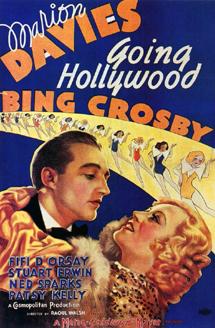Going Hollywood
| Going Hollywood | |
|---|---|

Theatrical release poster
|
|
| Directed by | Raoul Walsh |
| Produced by | Walter Wanger |
| Screenplay by | Donald Ogden Stewart |
| Story by | Frances Marion |
| Starring | |
| Music by | Lennie Hayton |
| Cinematography | George J. Folsey |
| Edited by | Frank Sullivan |
|
Production
company |
|
| Distributed by | Metro-Goldwyn-Mayer |
|
Release date
|
December 22, 1933 |
|
Running time
|
78 minutes |
| Country | United States |
| Language | English |
| Budget | $914,000 |
| Box office | $962,000 |
Going Hollywood is a 1933 American pre-Code musical film directed by Raoul Walsh and starring Marion Davies and Bing Crosby. It was written by Donald Ogden Stewart and based on a story by Frances Marion. Going Hollywood was released by Metro-Goldwyn-Mayer on December 22, 1933.
The film tells how an infatuated school-teacher, Sylvia Bruce, follows Bill Williams, a popular crooner, to Hollywood where he is to make a picture. On board the train she obtains a job as maid to Bill's French fiancee and leading lady, Lili Yvonne, and meets the film's director, Conroy, and promoter, Baker. On arrival in Hollywood she is befriended by Jill and shares her rooms.
At the Independent Art Studio in Hollywood, where the film is being made, Lili's temperament and lack of talent cause Conroy much concern. Eventually, after losing her temper with a woman who asks for her autograph, Lili refuses to continue unless the woman is removed from the Studio. She is persuaded to stay and production continues with her singing 'Cinderella's Fella' but Conroy is still not satisfied and an angry Lili walks out. Sylvia impersonates Lili's version of the song and ends with an imitation of Lili's tantrums. Lili returns in time to hear Sylvia and there is a brawl in which Lili gets a black eye. Baker, who has also heard Sylvia, intervenes by firing Lili and engaging Sylvia for the part.
Baker asks Sylvia to accompany him to a party but withdraws when Bill expresses his own interest in her. Bill takes Sylvia to dinner and the party but a quarrel ensues and she accuses him of insincerity. Bill deserts the film and goes with Lili to Tijuana where, drinking heavily, he receives a telephone call from the Studio with the ultimatum that if he does not return they will get a replacement. Lili advises him to let them do so and suggests that they fly together to New York and on to Paris. Sylvia finds him and pleads for him to come back to the Studio but returns without him.
In Hollywood there is difficulty with the player chosen to replace Bill and eventually Bill finally appears at the Studio to rejoin Sylvia in the film's closing sequence to sing 'Our Big Love Scene'.
The song 'Beautiful Girl' is sung by Crosby at the beginning of the film before his departure for Hollywood when technicians arrive to record it. When he boards the train at Grand Central Terminal there is a big production number where he and the chorus sing 'Going Hollywood'. He also sings a few lines of 'Just an Echo in the Valley'. Crosby is also heard singing 'Our Big Love Scene' on the radio when Jill is showing Sylvia her apartment. 'We'll Make Hay While the Sun Shines' is a dream-sequence production number with thunderstorm effects at the Studio and is featured by Crosby, Marion Davies, chorus and dancers. An impersonation act by The Radio Rogues is also filmed at the Studio and includes imitations of Kate Smith ('When The Moon Comes Over The Mountain'). Russ Columbo ('You Call It Madness But I Call It Love'), Morton Downey ('Remember Me?') and Rudy Vallee ('My Dime Is Your Dime'). Crosby sings 'After Sundown' at the party. 'Temptation' was an early film attempt to fit a song into the story pattern and was presented dramatically by Crosby whilst drinking tequila in a bar at Tijuana.
...
Wikipedia
